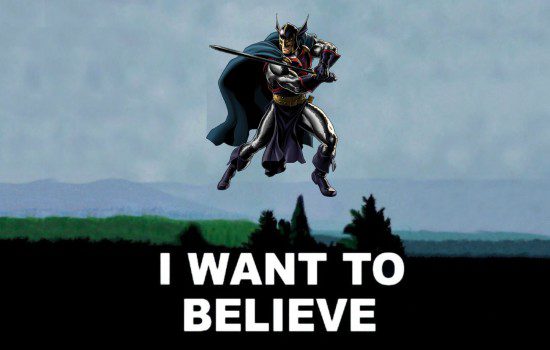If we don’t get the diagnosis right, we won’t get the prescription right either. That’s the point of yesterday’s post here about those caught up in the fantasy worlds of Satanic baby-killerism. What is the cause of their captivity to these lies? If we don’t correctly identify the cause, we’ll never correctly identify the cure.
Causes, probably, plural. This isn’t a simple, one-step problem with a simple, one-step solution. So the primary cures promoted in most of these articles — education, facts, better information — are necessary and helpful Good Things. Truth helps to counter lies. Good information helps to counter misinformation. These responses are like when the doctor tells you to get plenty of sleep, eat a healthy diet, and get some exercise. That’s always fine advice, but it may also be inadequate if, say, you’ve gone to that doctor because your leg is broken.

No amount of truth, education, facts or information will have any effect as long as the audience for them is in a state in which they’re unable and unwilling to receive them. The problem for those captive to the lie of Satanic baby-killerism is not that they are unaware of the truth, the facts, or the real information, but that they are choosing to reject all of that. It’s not that they’ve been deceived, but that they have chosen to participate in deception. It’s not that they are wholly confused about the difference between fantasy and reality, but that they have come to prefer the fantasy.
The cure cannot and will not come until they begin to choose differently. And that cannot and will not happen until they want to choose differently. It’s frustrating to me that so many of the scholars who study this stuff stop short of that. Their recommendations — facts, education — only ever go as far as presenting opportunities to choose in the hopes that, somehow, maybe, enough repeated opportunities will result in an eventual different choice. I think, instead, we have to understand why they’re choosing as they are. Address that why and we may enable a different and better outcome.
Here again is that NPR piece we looked at yesterday, “America’s Satanic Panic Returns — This Time Through QAnon.” One of the experts NPR talked to is Mary de Young, a scholar with a ton of experience and insight into moral panics. “Every moral panic has to have a folk devil,” De Young says, identifying a key feature of the disease. “It has to have a person — or more likely a group of people, whether real individuals or fantasized individuals — who are the devils in the middle of all of this.”
But then at the end of the piece, asked for solutions, De Young seems to forget that entirely: “The best available weapon we have is to counter the information with facts, is to keep pressing for more information, because it’s in the area of facts that moral panics tend to collapse.”
The desperate need to create and latch onto “a folk devil” is not a consequence of inadequate information or a lack of facts. It comes from somewhere else and no amount of facts, education, or information will address that problem.
If someone comes up to you and says, “I have a desperate need to believe in a folk devil — I have to have a person or group of people who are the devils in all of this” then your response should not be a recitation of facts. Your response should be to figure out why this person has arrived at a place where they “have to have” a devil, where they need and want and enjoy having imaginary Satanic baby-killers to take an imaginary stand against.
And that brings us back to what we discussed yesterday, their need “to see themselves as heroic” when they recognize, deep down, that they are not. As long as they need to see themselves as heroes, they are going to choose the fantasy that allows them to do that over the reality that doesn’t. Facts won’t help someone who is choosing not to look at the facts because they need to think of themselves in a way that the facts won’t allow.
This need to imagine oneself as heroic is why I took the title for yesterday’s post from David Bowie’s “Heroes.” I chose that particular lyric — “The shame … was on the other side” — because I think that points to some of what is driving this need: Shame. An unbearable, intolerable shame that has to be evaded or pushed over onto “the other side” — onto the “folk devils” instead of on us.
This shame has both legitimate and illegitimate sources. The latter is a bit more nebulous, but it comes from the idea that any life that is not exceptional is somehow unworthy and inadequate — the idea that we must all be above average, must either be heroes or be worthless. If you’ve bought into that idea, then there’s no use just trying to be good or decent or solid or reliable or faithful or steady. Those all become synonyms for worthlessness. It’s no good being good, you need to be outstanding, extraordinary, superlative.
And so the superlative good you imagine you’re required to be in turn will require a superlative evil to combat — a secretive cabal of Satanic baby-killers. (They have to be a secret cabal or else everyone would be against them and your opposition to them wouldn’t make you extra super-special like you think you need to be.) Chasing this need to be superlatively good will cause you to turn your back on mere common decency. You’ll become so obsessed with the need to be a hero that you’ll be incapable of simply being a mensch.
I describe this as an illegitimate source of shame because it’s based on the idea that one is required to be something that no one is required to be. It’s the shame of failing to be superhuman, something that ought not to be shameful at all.
The legitimate sources of shame are more tangible and concrete. This is the shame that comes from actual guilt, complicity, responsibility and irresponsibility. It is the shame that comes not just from the intolerable, almost unsurvivable realization that not only are we not heroes, but that we have seen real heroes and we have opposed them at every step, beaten them back, and celebrated their defeat.
That, too, is a fact, but it is a fact that can be unbearably hard to accept. Coming to grips with that fact and committing to all of its implications requires what we might describe as an extraordinary measure of courage. We might even say that it’s heroic.










